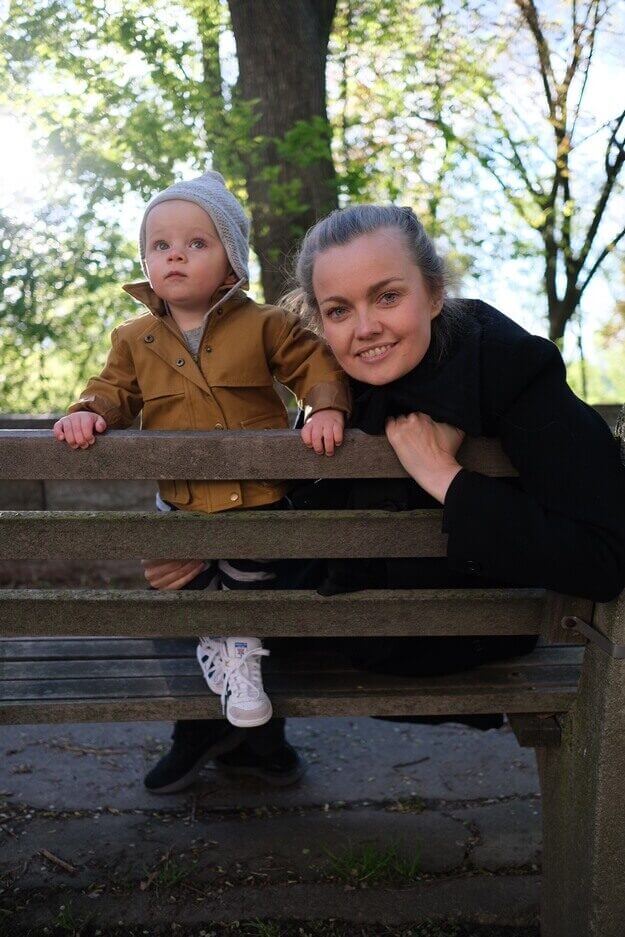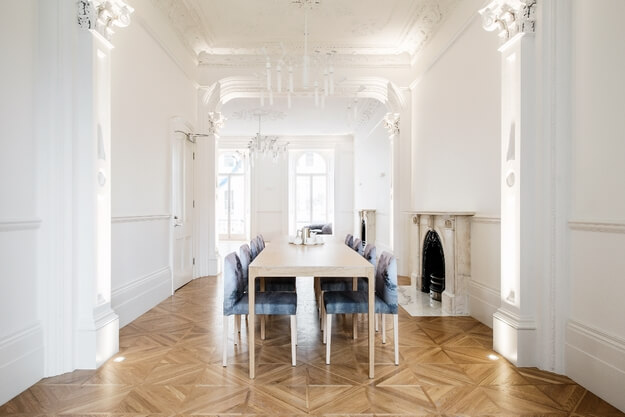Jaanika Peerna, Cultural Affairs Coordinator at the Estonian Consulate General in New York interviews architect Margit Argus, currently based in New York.

Margit Argus with her son.
Jaanika Peerna: What are you up to?
Margit Argus: I am the co-founder and creative partner of KAOS Architects and my company has been operating for 10 years.
We have created buildings and structures mainly in Estonia, but also Moscow, London, Brussels, and the USA.
The Estonian Consulate in San Francisco is, for example, one of our current works in prog-ress. Since December 2018 my family and I travel back and forth, splitting time between Tallinn, where my company is located, and New York, where my husband is currently employed.
JP: How has your life changed during the global COVID-19 crisis?
MA: Luckily and most importantly only a few people that I know were affected and they all recovered. No one in my closer circles lost a loved one, but my heart goes out to everyone who did.
When it comes to my everyday life during this crisis, I am of course affected by the provisions the government enacted. Of course, I miss the social exchange with employees and clients. Working from home, though, is not necessarily a new concept to me since a year ago, our little son Jakob was born.
As a young mother, I realize firsthand how difficult it is to find the balance between a successful career on the one hand and quality time with the family on the other.
Advances in communication technologies in recent years can help us address exactly these kinds of difficulties by enabling us to completely redefine many of our established work processes.
Meetings and project work can now be efficiently carried out virtually. This efficiency, in turn, creates free time for family. Until the outbreak of the crisis, however, I often felt that these technologies, especially virtual exchange, were often not used to their full potential.
COVID-19 acted as a catalyst, and since then I have seen exchange and collaborative work across the planet as I have never seen before.
Aside from all the tragedy and suffering that this virus causes our so-ciety, one of the positive developments is, in my eyes, the increased embrace of technologies of virtual exchange.
JP: What will the world be like post-pandemic?
MA: This crisis has demonstrated once more how connected and dependent we are as a global community. Unfortunately, some voices blame this very global connection for the emergence of the crisis. I think that is wrong.
The truth is that viral pandemics are inhe-rent to our biological existence and will always be there. But sectarianism and a lack of transparency do help the spread of a pandemic like this.
Cooperation and knowledge exchange, on the other hand, will help us to contain it.
There is proof for that on every level—local as well as global—every day throughout this crisis, and I hope it is this insight rather than suspicion and xenophobia that will prevail.
Another hope is that the shift of our attention to the core values of our existence, social cooperativity and sustainability, will outlast this crisis.
Two months of economic slowdown in our consumer-hungry society already offered some relief for our fragile ecosystem.
If we find a way to change our economic environment to something more sustainable while at the same time ensuring economic stability for a maximum number of people, this would be a dream come true.
This crisis has shown once more the enormous adaptability, potential, creativity, and compassion of both local and global communities, and put lasting changes at least in the realm of possibilitiy.

Estonian Embassy in London, KAOS Architects
In our work at KAOS we constantly strive to let the ideas of sustainability, affordability, and social context guide our creative work. Architecture should not be an end in itself, but serve the community, and I have to say, Estonia is certainly a role mode in this respect.
Cultural Newsletter of the Consulate General of Estonia in New York













